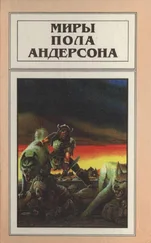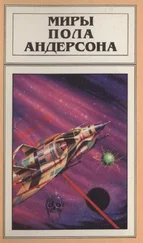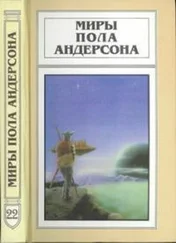Пол Андерсон - Gypsy
Здесь есть возможность читать онлайн «Пол Андерсон - Gypsy» весь текст электронной книги совершенно бесплатно (целиком полную версию без сокращений). В некоторых случаях можно слушать аудио, скачать через торрент в формате fb2 и присутствует краткое содержание. Жанр: Фантастика и фэнтези, на английском языке. Описание произведения, (предисловие) а так же отзывы посетителей доступны на портале библиотеки ЛибКат.
- Название:Gypsy
- Автор:
- Жанр:
- Год:неизвестен
- ISBN:нет данных
- Рейтинг книги:3 / 5. Голосов: 1
-
Избранное:Добавить в избранное
- Отзывы:
-
Ваша оценка:
- 60
- 1
- 2
- 3
- 4
- 5
Gypsy: краткое содержание, описание и аннотация
Предлагаем к чтению аннотацию, описание, краткое содержание или предисловие (зависит от того, что написал сам автор книги «Gypsy»). Если вы не нашли необходимую информацию о книге — напишите в комментариях, мы постараемся отыскать её.
Gypsy — читать онлайн бесплатно полную книгу (весь текст) целиком
Ниже представлен текст книги, разбитый по страницам. Система сохранения места последней прочитанной страницы, позволяет с удобством читать онлайн бесплатно книгу «Gypsy», без необходимости каждый раз заново искать на чём Вы остановились. Поставьте закладку, и сможете в любой момент перейти на страницу, на которой закончили чтение.
Интервал:
Закладка:
GYPSY
BY POUL ANDERSON
From afar, I caught a glimpse of the Traveler as my boat swung toward the planet. The great spaceship looked like a toy at that distance, a frail bubble of metal and air and energy against the enormous background of space. I thought of the machines within her, humming and whirring and clicking very faintly as they pursued their unending round? of services, making that long hull into a living world—the hull that was now empty of life— and I had a sudden odd feeling of sympathy. As if she were alive, I felt that the Traveler was lonely.
The planet swelled before me, a shining blue shield blazoned with clouds and continents, rolling against a limitless dark and the bitterly burning stars. Harbor, we had named that world, the harbor at the end of our long journey, and there were few lovelier names. Harbor, haven, rest and peace and a sky overhead as roof against the naked blaze of space. It was good to get home.
I searched the heavens for another glimpse of the Traveler , but I couldn't find her tiny form in that thronging wilderness of stars. No matter, she was still on her orbit about Harbor, moored to the planet, perhaps forever. I concentrated' on bringing the spaceboat down.
Atmosphere whistled about the hull. After a month in the gloom and poisonous cold of the fifth planet, alone among utterly unhuman natives, I was usually on fire to get home and brought my craft down with a recklessness that overloaded the gravity beams. But this time I went a little more carefully, telling myself that I'd rather be late for supper than not arrive at all. Or perhaps it was that brief chance vision of the Traveler which made me suddenly thoughtful. After all, we had had some good times aboard her.
I sent the boat slanting toward the peninsula in the north temperate zone on which most of us were settled. The outraged air screamed behind me as I slammed down on the hard-packed earth that served us for a landing field. There were a few warehouses and service shops around it, long low buildings of the heavy timbers used by most of the colonists, and a couple of private homes a kilometer or so away. But otherwise only long grass rustled in the wind, gardens and wild groves, sunlight streaming out of a high blue sky. When I stepped from the boat, the fresh vivid scent of the land fairly leaped to meet me. I could hear the sea growling beyond the horizon.
Tokogama was on duty at the field. He was sitting on the porch of the office, smoking his pipe and watching the clouds sail by overhead, but he greeted me with the undemonstrative cordiality of old friends who know each other too well to need many words.
"So that's the portmaster," I said. "Soft touch. All you have to do is puff that vile-smelling thing and say hello to me."
"That's all," he admitted cheerfully. "I am retained only for my uncommonly high ornamental value."
It was, approximately, true. Our aircraft used the field with no formality, and we only kept this one space vessel in operation. The portmaster was on hand simply to oversee servicing and in the unlikely case of some emergency or dispute. But none of the colony's few public posts—captain, communications officer, and the rest—required much effort in as simple a society as ours, and they were filled as spare-time occupations by anyone who wanted them. There was no compensation except getting first turn at using the machinery for farming or heavy construction which we owned in common.
"How was the trip?" asked Tokogama.
"Pretty good," I said. "I gave them our machines and they filled my holds with their ores and alloys. And I managed to take a few more notes on their habits, and establish a few more code symbols for communication."
"Which is a very notable brick added to the walls of science, but in view of the fact that you're the only one who ever goes there it really makes no odds." Tokogama's dark eyes regarded me curiously. "Why do you keep on making those trips out there, Erling? Quite a few of the other boys wouldn't mind visiting Five once in a while. Will and Ivan both mentioned it to me last week."
"I'm no hog," I said. "If either of them, or anyone else, wants a turn at the trading job, let 'em learn space piloting and they can go. But meanwhile—I like the work. You know that. I was one of those who voted to continue the search for Earth."
Tokogama nodded. "So you were. But that was three years ago. Even you must have grown some roots here."
"Oh, I have," I laughed. "Which reminds me I'm hungry, and judging by the sun it's the local dinner time. So I'll get on home, if Alanna knows I'm back."
"She can't help it," he smiled. "The whole continent knows when you're back, the way you rip the atmosphere coming in. That home cooking must have a powerful magnetic attraction."
"A steak aroma of about fifty thousand gauss—" I turned to go, calling over my shoulder: "Why don't you come to dinner tomorrow evening? I'll invite the other boys and we'll have an old-fashioned hot air session."
"I was sort of hinting in that direction," said Tokogama.
I got my carplane out of the hangar and took off with a whisper of air and a hum of grav-beam generators. But I flew low over the woods and meadows, dawdling along at fifty kilometers an hour and looking across the landscape. It lay quietly in the evening, almost empty of man, a green fair breadth of land veined with bright rivers. The westering sun touched each leaf and grass blade with molten gold, an aureate glow which seemed to fill the cool air like a tangible presence, and I could hear the chirp and chatter of the great bird flocks as they settled down in the trees. Yes—it was good to get home.
My own house stood at the very edge of the sea, on a sandy bluff sloping down to the water. The windy trees which grew about it almost hid the little stone and timber structure, but its lawns and gardens reached far, and beyond them were the fields from which we got our food. Down by the beach stood the boathouse and the little dock I had made, and I knew our sailboat lay waiting there for me to take her out. I felt an almost physical hunger for the sea again, the mighty surge of waves out to the wild horizon, the keen salt wind and the crying white birds. After a month in the sterile tanked air of the spaceboat, it was like being born again.
I set the plane down before the house and got out. Two small bodies fairly exploded against me—Einar and Mike. I walked into the house with my sons riding my shoulders.
Alanna stood in the doorway waiting for me. She was tall, almost as tall as I, and slim and red-haired and the most beautiful woman in the universe. We didn't say much—it was unnecessary, and we were otherwise occupied for the next few minutes.
And afterward I sat before a leaping fire where the little flames danced and chuckled and cast a wavering ruddy glow over the room, and the wind whistled outside and rattled the door, and the sea roared on the nighted beach, and I told them of my fabulous space voyage, which had been hard and monotonous and lonely but was a glamorous adventure at home. The boys' eyes never Stirred from my face as I talked, I could feel the eagerness that blazed from them. The gaunt sun-seared crags of One, the misty jungles of Two, the mountains and deserts of Four, the great civilization of Five, the bitter desolation of the outer worlds—and beyond those the stars. But we were home now, we sat in a warm dry house and heard the wind singing outside.
I was happy, in a quiet way that had somehow lost the exuberance of my earlier returns. Content, maybe.
Oh, well, I thought. These trips to the fifth world were becoming routine, just as life on Harbor, now that our colony was established and our automatic and semiautomatic machines running smoothly, had quieted down from the first great riot of work and danger and work again. That was progress, that was what we had striven for, to remove want and woe and the knife-edged uncertainty which had haunted our days. We had arrived, we had graduated into a solid assurance and a comfort which still held enough unsureness and challenge to keep us from getting sluggish. Grown men don't risk their necks climbing the uppermost branches of trees, the way children do; they walk on the ground, and when they have to rise they do so safely and comfortably, in a carplane.
Читать дальшеИнтервал:
Закладка:
Похожие книги на «Gypsy»
Представляем Вашему вниманию похожие книги на «Gypsy» списком для выбора. Мы отобрали схожую по названию и смыслу литературу в надежде предоставить читателям больше вариантов отыскать новые, интересные, ещё непрочитанные произведения.
Обсуждение, отзывы о книге «Gypsy» и просто собственные мнения читателей. Оставьте ваши комментарии, напишите, что Вы думаете о произведении, его смысле или главных героях. Укажите что конкретно понравилось, а что нет, и почему Вы так считаете.












